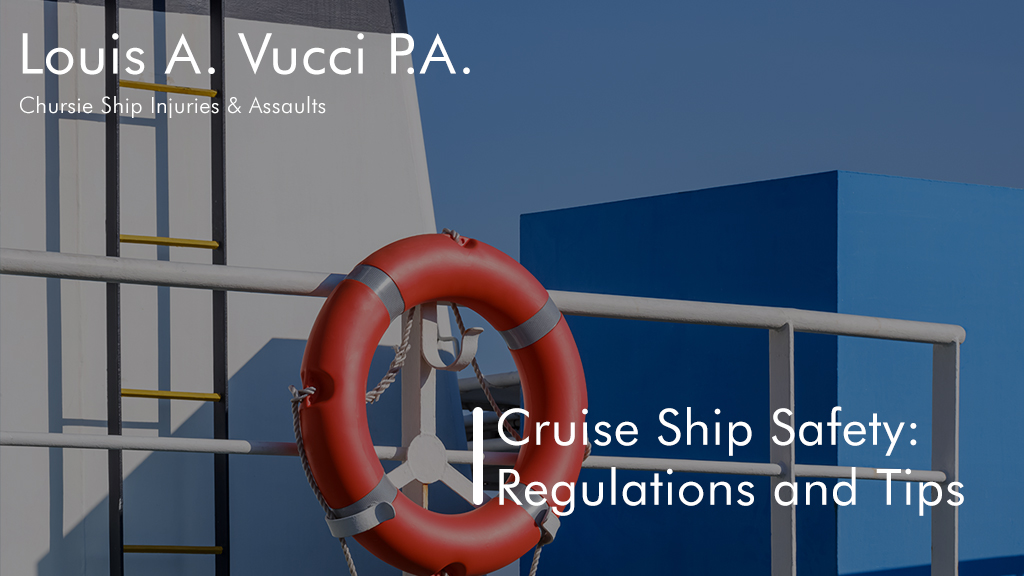Menu
Free Confidential Consultation

All cruise ships follow safety-related regulations, including emergency procedures, ship design, and crew training. These rules help the cruise industry keep strong safety management standards to protect passengers and crew.
Whether you’re a passenger or a crew member, knowing these safety measures can help you feel more confident and comfortable on your cruise. Keep reading to learn more about cruise ship safety.
Cruise ship safety regulations are established to provide a security guide on how cruise ships operate. Many cruise ships go above and beyond global standards, including carrying backup mechanical equipment and provisions. Cruise ships are regularly inspected by government officials for things like safety, sanitation, environmental protection, and response to criminal activity.
Some of the specific laws and regulations that govern cruise ships include:
International Convention for the Safety of Life at Sea (SOLAS)
The International Convention for the Safety of Life at Sea is one of the most important international regulations in the cruise industry. It was established by the International Maritime Organization to set strict requirements for how ships should be constructed, operated, and equipped.
One of its main goals is to reduce the risk of emergencies like ship fires. That is why the law requires cruise ships to have fire protection systems like sprinkler systems, fire doors, and fire detection alarms throughout the vessel.
The Cruise Vessel Security and Safety Act requires ships to follow new requirements for crime reporting, environmental protection, and handling emergency situations. A major reason it was established was because of the prevalence of sexual and physical assault, as well as cases of missing persons on cruise ships. For safety, the organization provided the Coast Guard with detailed guidance on how to make sure cruise lines comply with the CVSSA’s safety standards. It also set up a course curriculum to train at least one crew member on how to prevent crime and handle evidence properly.
The Jones Act, also called the Merchant Marine Act of 1920, plays an important role in keeping the cruise industry in the U.S. safe and reliable. It requires ships traveling between U.S. ports to be built, owned, and operated by U.S. citizens or permanent residents. The Jones Act also offers safety provisions for crew members. For example, if a seaman gets injured on the job, they're allowed to sue their employers for negligence.
Maritime law, also known as admiralty law, is a unique set of safety regulations that apply only when cruise ships are at sea. Maritime law jurisdiction depends on which country’s flag the ship is flying. For example, a cruise ship flying the American flag in the Persian Gulf follows U.S. maritime law and not the laws of the surrounding countries.
Under Maritime law, if you're a victim of a slip and fall accident due to a wet floor or you get sick from food contamination, you're allowed to file an injury claim.
Before a cruise ship sets sail, all passengers and crew must take part in a safety drill. There are two types of safety drills: the traditional muster drill and the e-muster drill. In a traditional drill, crew members will guide you to your assigned muster station and explain safety steps in person. They'll also show you the right way to put on life jackets and how life rafts are deployed.
The e-muster drill, on the other hand, lets you watch safety videos on your phone or cabin TV before checking in at your muster station. Either way, these safety drills help everyone onboard know how to respond in case of an emergency or the unlikely event of an evacuation.
Whether you're traveling solo, with kids, or as a senior, it’s important to know a few basic cruise ship safety tips to have an enjoyable cruise experience. Here are some tips to help you feel more secure:
If you’ve been injured on a cruise, you may be entitled to compensation, but only if liability is proven. This means that you have to prove that the cruise line failed to act with reasonable care and that their negligence directly caused your injury. Once liability is proven, you can pursue different forms of compensation, including medical expenses, lost income, pain and suffering, and wrongful death damages.
However, when seeking compensation, it's important you work with an experienced cruise injury attorney to increase your chances of receiving compensation. It's also important to act quickly, as most cruise contracts have strict deadlines for reporting injuries and filing claims.
Whether it's your first voyage or you're a seasoned traveler, understanding cruise ship safety is necessary. From fire protection systems to extensive training for crew members, these safety measures exist to protect you from unlikely events.
At Louis A. Vucci P.A., we do all we can to protect passengers who’ve been injured due to poor cruise vessel security. Our team understands maritime law and how to handle passenger claims. Contact our cruise ship lawyer for a free consultation today.
Related Reading:
There are many things for which a passenger may make a claim, some of which include:
